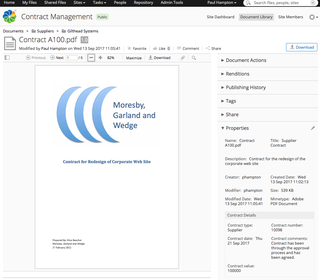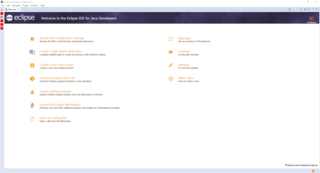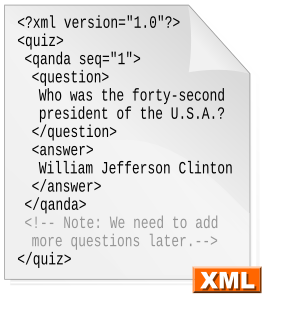
Wiki software is collaborative software that runs a wiki, which allows users to create and collaboratively edit "pages" or entries via a web browser. A wiki system is usually a web application that runs on one or more web servers. The content, including all current and previous revisions, is usually stored in either a file system or a database. Wikis are a type of web content management system, and the most commonly supported off-the-shelf software that web hosting facilities offer. There are currently dozens of actively maintained wiki engines, in a variety of programming languages, including both open source and proprietary applications. These vary widely in their platform support, in their support for natural language characters and conventions, and in their assumptions about technical versus social control of editing.

IBM Notes and IBM Domino are the client and server, respectively, of a collaborative client-server software platform sold by IBM.
An application server is a software framework that provides both facilities to create web applications and a server environment to run them.
The following tables compare general and technical information for a number of wiki software packages.

LAMP is an archetypal model of web service stacks, named as an acronym of the names of its original four open-source components: the Linux operating system, the Apache HTTP Server, the MySQL relational database management system (RDBMS), and the PHP programming language. The LAMP components are largely interchangeable and not limited to the original selection. As a solution stack, LAMP is suitable for building dynamic web sites and web applications.

Alfresco is a collection of information management software products for Microsoft Windows and Unix-like operating systems developed by Alfresco Software Inc. using Java technology. Their primary software offering, branded as a Digital Business Platform is proprietary & a commercially licensed open source platform, supports open standards, and provides enterprise scale.
CrushFTP is a proprietary multi-protocol, multi-platform file transfer server originally developed in 1999. CrushFTP is shareware with a tiered pricing model. It is targeted at home users on up to enterprise users.
Servoy is a development and deployment platform for enterprise applications, written itself in Java, and which uses JavaScript as its development language. It can adopt the native look and feel of any platform or the web, using HTML and CSS code. Servoy was created from the start to make business application development easy. It has introduced many innovations for that purpose: the use of JavaScript instead of Java, a comprehensive development framework with building blocks that are added through drag and drop, a web client, etc.
Nuxeo is a software company making an open source content management system.
EGroupware is free open-source groupware software intended for businesses from small to enterprises. Its primary functions allow users to manage contacts, appointments, projects and to-do lists. EGroupware is based on PHP. The projects spreads its software under the terms of GNU General Public License (GPL).

WaveMaker is a private aPaaS software for building and running custom apps. WaveMaker provides Rapid API App Development & Deployment to build enterprise-grade multi-device apps, and leverages Docker containerization for an app-optimized infrastructure.
O3Spaces is a document management system developed by O3Spaces B.V.. It is built by a team of software engineers based in the Netherlands using OpenOffice.org, StarOffice, and ODF-centric applications as enterprise office and collaboration solutions. The product is written in Java, and based on the Tomcat server with a PostgreSQL backend. O3Spaces works by providing users a single web-based team environment, with built-in search capabilities and an optional Desktop Assistant. Its search functionality is said to work across PDF, ODF, and Microsoft Office document formats. Currently Firefox, Internet Explorer and Safari are supported.
OpenSearchServer is an open-source application server allowing development of index-based applications such as search engines. Available since April 2009 on SourceForge for download, OpenSearchServer was developed under the GPL v3 license and offers a series of full text lexical analyzers. It can be installed on different platforms.
Umbraco is an open-source content management system (CMS) platform for publishing content on the World Wide Web and intranets. It is written in C# and deployed on Microsoft based infrastructure. Since version 4.5, the whole system has been available under an MIT License.
Pimcore is a software company. It offers free and open-source customer experience management, digital asset management, product information management, multi-channel publishing and e-commerce software.

Foswiki is an enterprise wiki, typically used to run a collaboration platform, knowledge base or document management system. Users can create wiki applications using the Topic Markup Language (TML), and developers can extend its functionality with plugins.

DBeaver is an SQL client and a database administration tool. For relational databases it uses the JDBC API to interact with databases via a JDBC driver. For other databases (NoSQL) it uses proprietary database drivers. It provides an editor that supports code completion and syntax highlighting. It provides a plugin architecture that allows users to modify much of the application's behavior to provide database-specific functionality or features that are database-independent. This is a desktop application written in Java and based on Eclipse platform.














